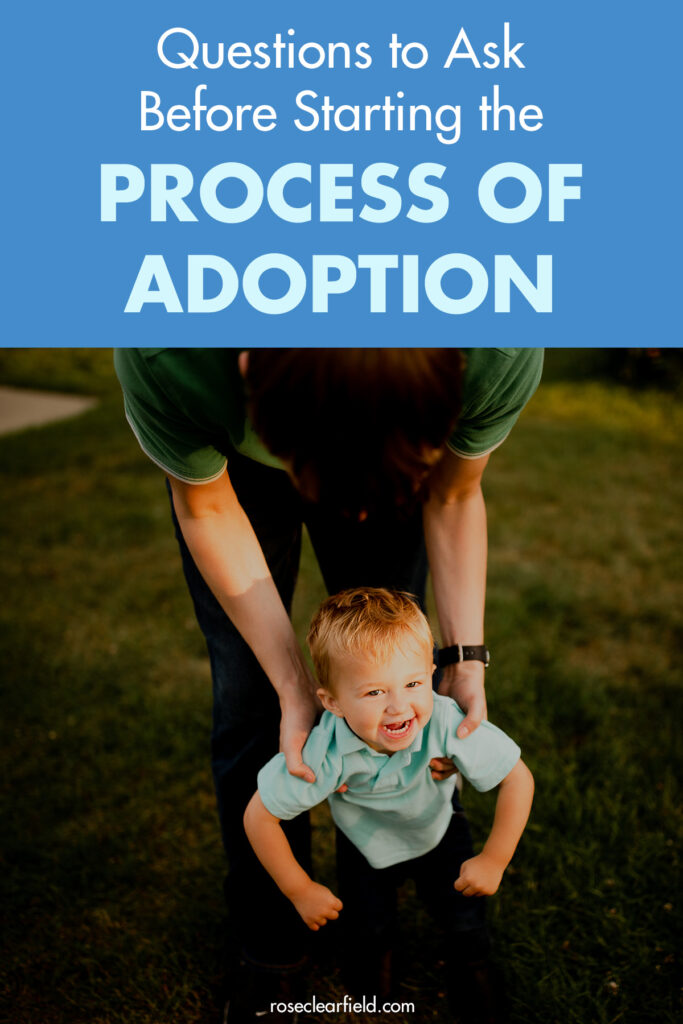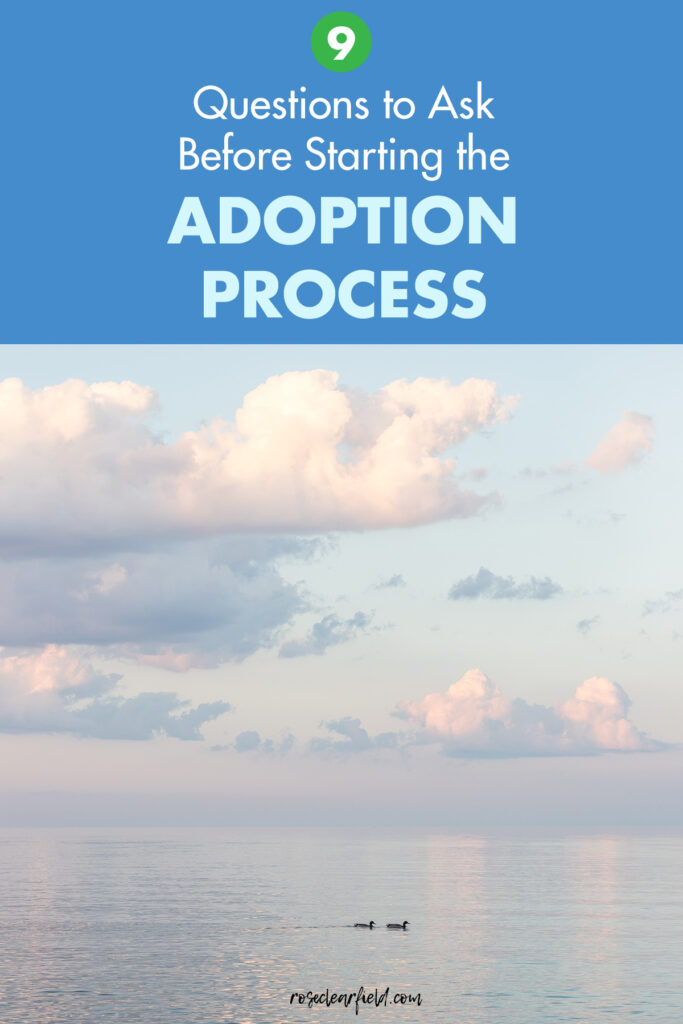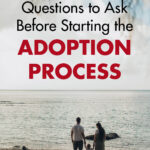Adoption is a lengthy, expensive process. It’s important to review critical questions to ask before starting the adoption process to ensure both you and your partner are ready to begin your home study.
Why do we want to adopt?
Ultimately, you should choose to pursue adoption because you feel called to grow your family through adoption. Whether you’ve faced infertility or other medical issues or simply feel like adoption is the best path for your family, choosing adoption to grow your family should be at the heart of your decision.
A lot of people have a “we’re saving the world” mentality about adoption, which isn’t a healthy perspective. When you begin the adoption process, you need to be realistic about what you can handle. Saying yes to an adoption opportunity far beyond your financial means or with medical components and other factors that you aren’t prepared to take on isn’t a good idea.
Obviously, most adoption situations are complicated, or people wouldn’t be considering adoption. You want to keep your heart open throughout the entire adoption process. But I encourage you to think twice if you’re really hung up on the “we’re saving the world” element.
Are we ready to move on from fertility treatments?
In other posts, I discuss how I don’t believe that you need to be healed completely from your infertility past before moving on to adoption to grow your family. A lot of adoption articles tell you as such, which isn’t realistic. The loss of growing your family through pregnancy is a grieving process. If you’ve faced any significant grieving in your life, you know that one, it takes time, and two, it never goes away completely.
With that being said, pursuing fertility treatments actively while you begin the adoption process isn’t a good idea. Both means of growing your family are expensive and have a strong emotional component. Commit fully to one or the other. Don’t start working on your home study until you’ve finished your final fertility treatment.
Is our marriage in a good position for growing our family through adoption? Are both partners on the same page with adoption?
There is never a perfect time to adopt. If you wait until everything in your life lines up exactly the way you want, you’ll never adopt. But it’s also important to choose a time that makes sense for your family. Adding children to the equation is never a way to improve a struggling marriage. If you and your partner are going through a rough period, it’s critical to work through it before you move forward with adoption.
Additionally, it’s important that both partners feel comfortable about pursuing adoption. You’ll never be on exactly the same page with every aspect of adoption, which is okay. But you don’t want to move forward with it unless it’s something that you both want and you feel like you’re in a good position to do so at this point in your lives.
Are we prepared to embark on a process to grow our family that involves a lot of uncertainty and lack of control?
There is always an element of uncertainty and lack of control that comes with growing your family. Even with a planned pregnancy, you can’t orchestrate exactly how the pregnancy and birth will go. However, adoption involves a whole different level of uncertainty and lack of control. You have to do the best that you can with the elements that you can control, such as completing the home study and creating a profile book. Then you have to trust that it will work out the way that it’s supposed to from there.
Are we comfortable raising children who aren’t biologically related to us?
Adoption is a means of growing a family. It’s not a replacement for pregnancy. Even when you have a great experience with adoption and feel a close connection with your adopted children right from the start, it’s not the same as raising biological children. It’s ideal to embrace the adoption experience and be open with your children about their adoptions from birth. The sooner you start talking to them about adoption, the more comfortable you’ll be with the topic by the time they start asking questions.
What sort of adoption do we want to pursue?
Deciding to pursue adoption is the first step. From there, you must decide which type of adoption is the best fit for you and your family. For most couples pursuing adoption, you’ll be choosing between domestic infant adoption, foster adoption, and international adoption. Then you’ll start the home study process with a state foster agency or private adoption agency. It’s important to research these options thoroughly before moving forward. If you decide to use a private adoption agency, I recommend talking to at least two different agencies before committing to one. It is possible to switch agencies, but it’s not easy and will significantly delay the process. The more you can do to ensure you’re working with a great agency from the start, the better.
What is our maximum budget for adopting?
Be honest with yourself about how much you’re able to spend on adoption. Explore options that fit within your budget. A reputable adoption agency will be transparent about their costs upfront. They will not pressure you to pursue situations that go beyond your maximum budget. For example, even when an agency has a set budget, there may be adoption opportunities that go beyond it, such as an out of state opportunity or a situation with significant birth mom expenses.
You don’t need to have all of the money upfront before you begin your home study. However, you should have a clear plan for acquiring the remaining funds in a timely fashion, so you don’t find yourself in a pinch if the right adoption opportunity presents itself more quickly than you anticipate.
Are we open to transracial adoption?
As part of the home study process, you must list your preferences, which include gender, race, and exposure to cigarettes, alcohol, and drugs. You’ll complete this type of preferences sheet, so the agency has your preferences on hand for potential opportunities. It’s imperative to review the paperwork as a couple. Talk through your preferences and concerns before meeting with your social worker. There are no right answers. Be honest with yourselves about what you’re prepared to handle and what is best for your family.
If you’re unsure about whether you’re open to adopting a child of another race, I recommend researching transracial adoption. Find a few blogs with firsthand accounts of transracial adoption. If possible, talk to families with adopted children of races other than their own. If you don’t have any direct connections, reach out to your agency. They may be able to put you in touch with local families.
Keep in mind that in most circumstances, regardless of what you list on your preferences sheet, your agency will still share situations with you that don’t fit your exact perimeters. Your agency may also send you a situation with a note such as, “I think you’d be a great fit for this expectant mom, but I wanted to know how you feel about [X, Y, and Z] elements of the situation. Let me know what you think before we present on Monday.”
I encourage you to open every profile opportunity email and review the entire situation, regardless of your initial reaction. It’s very likely that you’ll feel called to say yes to profile opportunities that don’t fit the exact specifications you outlined on your initial preferences sheet.
Are we open to open adoption?
The vast majority (90% or higher) of domestic infant adoptions in the United States today have some level of openness. In many adoptions that take place through the foster care system, both babies and older children, there is also some level of openness. If it’s not directly with the birth parents, it’s with other birth family (i.e., siblings, grandparents). For most people, open adoption is a scary concept that includes a lot of misconceptions. Again, I urge you to start reading first-hand accounts of open adoption from adoptive families as well as birth families. I also encourage you to listen with an open mind and heart to any and all advice your agency gives you about open adoption.
If you’ve been reading my blog for any length of time, you probably know that we have a very open relationship with my son’s birth mom and her family and that I’m a huge advocate of open adoption. We went into domestic infant adoption without much of an idea what open adoption might look like beyond sending monthly updates and pictures. I’m very thankful that we kept our hearts open throughout the process. We’d never be where we are today otherwise.
Above all else, put yourself in your future adopted child’s shoes for a minute. One of the biggest gifts you’ll ever be able to give your adopted child is the opportunity to learn about his or her birth family. Even if you don’t have a close relationship with birth family, having an open adoption comes with a lot of information that will make it easier for your son or daughter to find their biological relatives in the future.
Finally, open adoption is one of the biggest gifts you’ll ever be able to give your adopted child’s birth family. Open adoption gives them the opportunity to know how their child is doing, which is a huge peace of mind.
Adoptive parents, as always I’d love your input on this topic!
Are there other key questions to ask before starting the adoption process?
Pin this post for easy access to the questions to ask before starting the adoption process resource later!

More adoption resources:
Visit the adoption section of the blog for even more adoption resources, including resources pertaining to open adoption and waiting to adopt.






